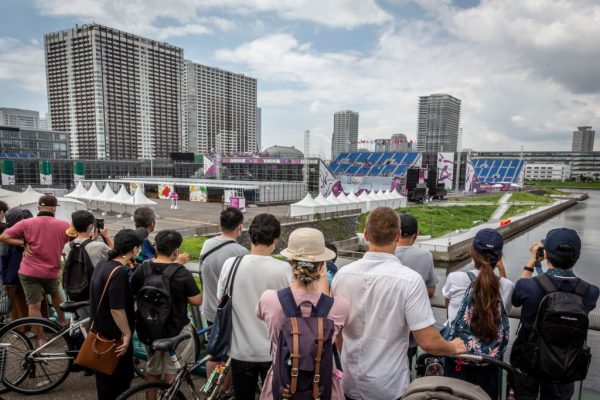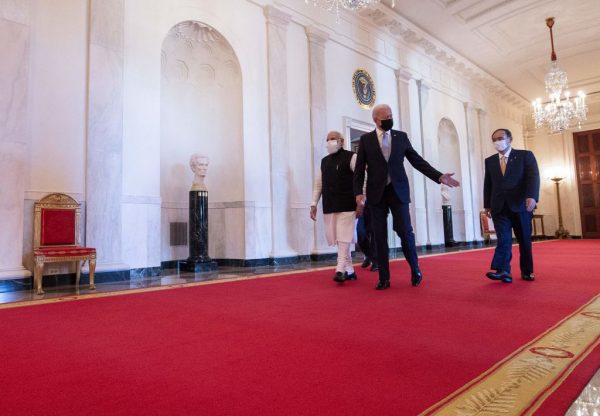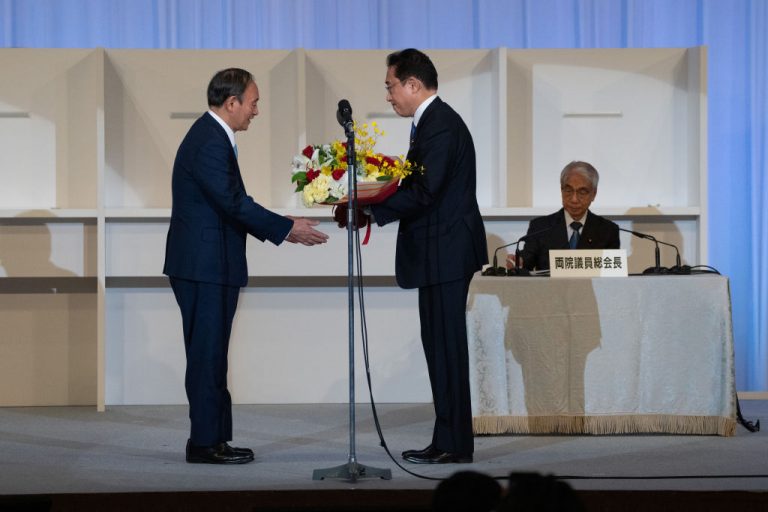When Japanese Prime Minister Yoshihide Suga announced in September that he would be stepping down, the Japan Times indicated that his was a bombshell decision, reporting that the Japanese business community was “stunned”. The PM has been in office for only one year and had initial polls in his favor as high as 70%. As incoming PM Fumio Kishida prepares to take office, references to Suga’s plummeting popularity after an Olympic-fueled COVID-19 surge is boilerplate across the media.
But how accurate is our memory of the global changes that have occurred in the past year alone? What happened to Suga’s popularity has happened to other global leaders during the pandemic; some, to the point of being forced from office, and others, it has been a bitter loss in the court of public opinion. Taking the time to review the unique facts behind the boilerplate shows us a leader who was a team player among his own political party, and one who appears to have acted for a common goal at the expense of his own rule. Whether the goal was in common with the G7, his own party, or his own people, is something that will be more fully etched in years to come.
Why was the once-popular prime minister conceding his office after only one year?
In understanding his exit, it helps to remember that Suga is a team player. The modest 72-year old exiting at this time was a “faithful lieutenant” to Prime Minister Shinzo Abe and, according to Japan Times, took the “helm at a critical moment when the country has been hit by a pandemic and economic slump and is grappling with national security issues.” He had served Abe for eight years. When Abe surprised Japan by stepping down due to health reasons, splits in Abe and Suga’s party, the LDP, were resolved in favor of backing Suga to ensure a stable continuation of policy.
But despite efforts to maintain calm, the waters were rocky from the beginning. According to the governor of the Bank of Japan, Kuroda Kirohiko, in a June 2020 report shared virtually, the Japanese economy dipped by 20% compared to the previous April under the first month of COVID-19 countermeasures in April of 2020. It rebounded as restrictions were cautiously eased that May. However, as the postponed Tokyo Olympics approached, a dreaded ‘second wave’ occurred beginning around the Lunar New Year of 2021, leading to a state of emergency that was declared in April of this year. The most severe COVID outbreak of the year occurred in conjunction with the Tokyo Olympics, bringing further restrictions, including the postponement of the Games and public dissatisfaction towards Suga.
Despite the public concerns of going forward with the Games, a certain current of thinking may have played a role in the decision to go forward with them. The Bank of Japan’s governor had portentously shared in the same summer 2020 report that concerns about a second wave gave rise to two points of focus to protect Japan’s economic outlook: first, “to ensure corporate financing” by maintaining stability and accommodating circumstances; secondly, to be sensitive to cautious household consumer behavior. Hirohiko mentioned there was potential for “some sort of hysterisis effect” that “could arise after a large shock”.
Success
You are now signed up for our newsletter
Success
Check your email to complete sign up
Such counsel may have informed Suga and his ministers in their work to keep the economy open and not halt the Olympics in 2021. At that time, a burgeoning wave of infections and hospitalizations threatened Japan concurrent with the approaching rescheduled international games. Japan had already taken the unprecedented measure of rescheduling the games by one year, and as the postponed games approached it was determined not to allow spectators due to the state of emergency in Tokyo.

Forbes reports that the public was especially piqued by the decision to go ahead with the Tokyo Olympics despite the surge in infections. Suga, a farmer from the north who is outside of Japanese political circles, worked well with former President Trump, and his cabinet initially enjoyed ratings as high as 70%.
Suga’s determination to go forward with the Olympics, which some advisors had told him would be an electoral risk, may have been partly a matter of honor; that is, “face”. Ngai Yeung, a member of the USC student think tank Glimpse of the Globe and a writer at Annenberg Media, suggests that Suga had vowed to continue the faltering Abe’s policies when the previous prime minister left office and therefore needed to continue the Tokyo Olympics project that Abe initiated. Another factor should also be elucidated. Due to Japan’s heavy lifting with Quad Alliance efforts countering China’s aggression, ‘loss of face’ is a compelling issue with actual geopolitical ramifications. Yeung also details that there is not only a unity but a ‘face’ issue regarding a G7-issued statement backing Suga’s efforts to continue with the Olympics, written in February of 2021: “we support the commitment of Japan to hold the Olympic and Paralympic Games Tokyo 2020 in a safe and secure manner this summer as a symbol of global unity in overcoming COVID-19.” Finally, although the Games in Japan were described in terms of economic loss, it may have been even worse had Suga not been determined to go ahead. Yeung cites that the initial postponement of the Games had cost between $15- and $25-million dollars and that further postponement threatened a higher bill.

Regarding his work with both the former and present US administrations, bolstering Japan’s strong participation in Quad’s efforts to guard against China, Suga may be credited more in the future than he is now. Suga told reporters after his first talk with Trump. “I told him the Japan-U.S. alliance was the foundation of regional peace and stability…We agreed to coordinate closely.” Trump invited Suga to call him 24/7, for emerging issues. Biden’s Indopacific strategy welcomed Suga’s input and Japan’s strong participation, which was forthcoming. According to Nikkei, Biden has requested Suga to continue to offer advice even after he steps down.
Suga navigated Japan through a difficult time and may have shielded his country and others from shock at his own expense. He also may have preserved his Liberal Democratic Party’s rule by taking the hit from public opinion and conceding his office only one year in, providing a relatively stable transfer of power. Meanwhile, the incoming PM, 64-year old former foreign minister Fumio Kishida, seeks “a free and open Indo-Pacific” maintained in part by countering China’s aggression. Domestically, Kishida has promised to lower the income gap through pay hikes. Kishida won following a challenge by Japan’s vaccination minister, Taro Kono.















